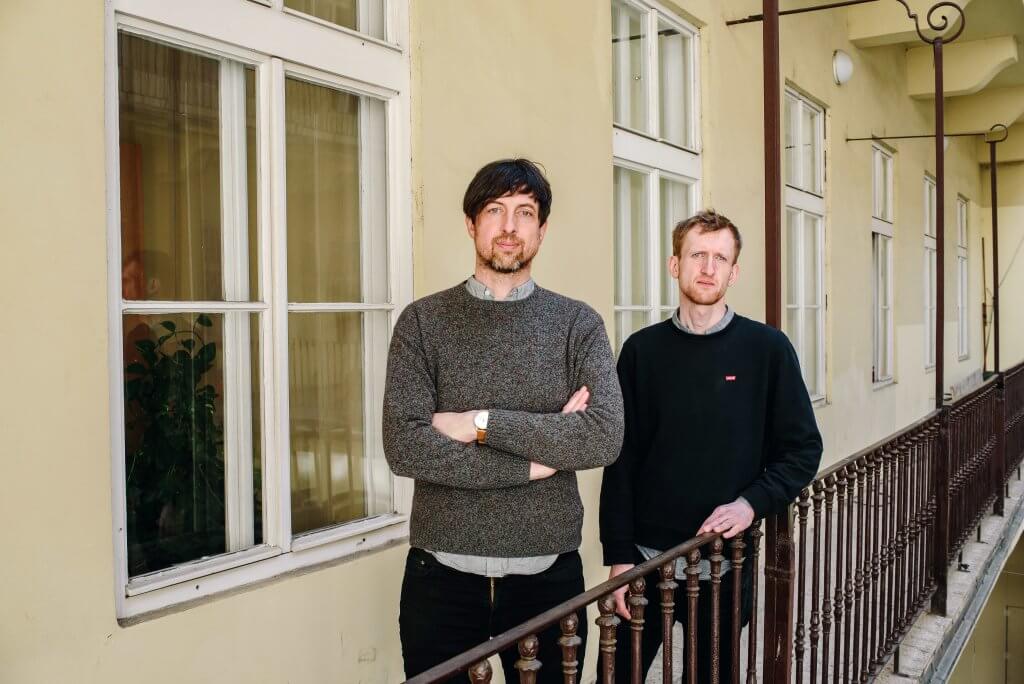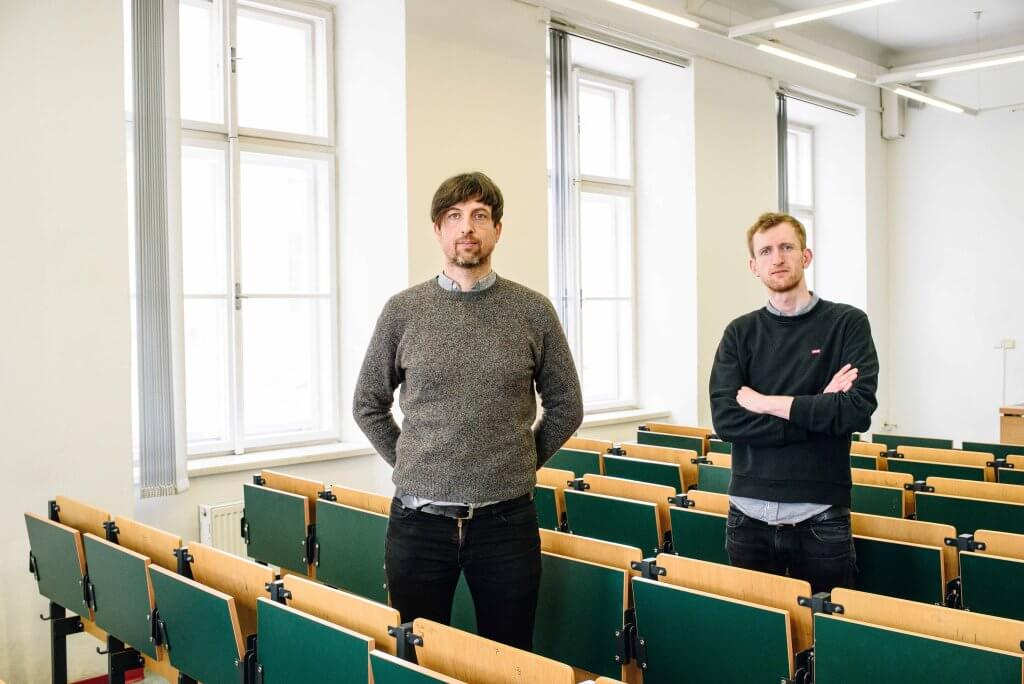Brothers from IKSŽ are engaged in research on the gaming industry. They are now mapping its situation on a regional level across Europe

Jaroslav and Jan Švelch work at the Institute of Communication Studies and Journalism. Their research focuses on the development of the gaming industry. As brothers, they often collaborate and consult on their academic work. Both are currently involved in the GAME-ER project, which is part of the European Union’s grant programme Horizon Europe.
The aim of the GAME-ER project is to explore the computer games industry at a local and regional level and to propose recommendations on how to develop gaming production in new locations by drawing on insights from the clusters analysed across Europe. These cities are Bordeaux, Brno, Dundee, Fundao, Lyon and Turin. “For the purposes of the project, the term cluster refers to the geographical concentration of the computer games industry. In other words, it is the increased presence of companies involved in game production in a given location,” Jan Švelch explains.
An important point of the project is to focus on clusters outside the main cities, which can serve as a model for the development of the computer games industry in other locations. The team from FSV UK is involved in work packages 4 and 5 and is also participating in work packages 2 and 3. Work package number 4, entitled Clusters Ecosystem – Case Studies, concerns empirical research in clusters. “Its main focus is to conduct semi-structured interviews with representatives of the gaming industry, but also other organisations and institutions involved in the running of the cluster, such as local authorities or professional organisations representing a large number of actors,” Jan Švelch says.
Package number 5 called Interactive Methodological Toolkit aims to prepare recommendations for legislators and regional governments. “The task of our team is to analyse existing recommendations in this area so that we can make a productive contribution to regional development and avoid repeating already known recommendations,” says Jan Švelch, who is the head of the research team at FSV UK, and is thus involved in all the packages mentioned above. His brother, doc. Jaroslav Švelch will be involved in package number 4, in which he will research the conditions of the Brno cluster and its history. “It is close to my heart as a person who has been very involved in gaming history,” he adds.

According to Jan Švelch, the project’s advantage is its focus on clusters outside the capitals and other European capitals. He points out that previous research on game production has often focused on the centres of the computer games industry, both at a global level (e.g. in the USA and Japan) and within individual national industries. “Our analysis can reveal the conditions and processes that have contributed to the development of the computer games industry in locations that do not automatically have a concentration of creative industries. We will then seek to use these insights to make recommendations that should ideally help in the further development of local clusters,” he says.
The project should thus result in an interactive toolkit that combines both an analytical part (i.e. an overview of the knowledge about the clusters analysed) and practical recommendations. The preparation of this tool is still at the very beginning, but one of the proposed options, according to Jan Švelch, is an interactive map. “An important task is also to ensure the operation of the tool after the end of the project. We will therefore be looking into whether existing professional organisations are interested in taking over the tool after the project has finished,” Jan Švelch explains. “In the application, it is also a great advantage that the consortium members are also professional associations, such as the Czech Game Developers Association, which can then use our findings in practice,” doc. Jaroslav Švelch adds.
Basic research on the gaming industry in the Czech Republic
Together they are also involved in the project Developing Theories and Methods for Game Industry Research, Applied to the Czech Case, which runs from 2020 and is part of the Charles University Primus programme. Unlike GAME-ER, this is a basic research project with relatively broadly defined objectives in order to explore the overall terrain of game industry studies and to propose approaches that could be applied in the future. Each member of the FSV UK team was thus able to work on topics close to their specialisation.
“In the project I studied industry reflexivity, i.e. how the games industry speaks for itself. For example, subtitles indicating the input of individual workers in a given game are an important part of this. I found that although games usually copy film in the structure of their subtitles, there are no generally accepted standards for who should be credited and how,” Jan Švelch says. Together with Tereza Fousek Krobová from IKSŽ, they also published a study on Czech women game journalists, who, according to their findings, have to face the prejudice that as women they do not understand games. As a result, they routinely face sexist insinuations that challenge their knowledge.

“I focused on local developers who use local realities or themes in their games – even though their games are primarily intended for a foreign audience. In our interviews, we found that they have artistic reasons for doing this (they can tell more believable stories this way) and practical reasons (they have easy access to reference material, like buildings they can photograph). It is also important that local topics excite the local community, which then cheers them on and supports them, for example in crowdfunding campaigns,” says doc. Jaroslav Švelch. “Overall, the most important result of the project, at least for me, is that we have managed to build a high-quality and functional team, with which we can then work further and apply for external grants, as we did in the case of GAME-ER,” he adds.
Mutual cooperation in academic work
Although both are involved in research on the games industry, their professional interests differ in some respects. Jan Švelch’s research focuses more on the current situation in game production. “In addition, my research also deals with analogue games such as Magic: The Gathering or Dungeons & Dragons, which are still overlooked in our field,” he says.
Doc. Jaroslav Švelch, on the other hand, often focuses on the history of computer games and computers. His monograph on games in normalization Czechoslovakia has been the most acclaimed of his works so far. Thanks to it, he has also become generally interested in contemporary local gaming in the Czech Republic and Central and Eastern Europe. “I don’t want to profile myself purely as a historian – I am also interested in theoretical questions and I do empirical research on the contemporary games industry. My last book was about monsters in computer games, which was a dream project for a long time,” he says.

As siblings, they regularly consult each other on their academic work. In their own words, they do “internal peer review”, where they read each other’s academic papers – whether they are full articles or abstracts for conferences. They also coordinate grant applications together and debate with each other over the concept of teaching, especially in terms of assignment design and assessment.
“Mostly we each write solo or with other co-authors, but we have written a few articles and grant applications together. At that point, it’s definitely an advantage that we know what to expect from each other and can get along quickly. We also don’t have to worry about offending each other with criticism,” says doc. Jaroslav Švelch. “The disadvantage is that sometimes colleagues in the field confuse us because of our similar names and initials, but this happens more to me because I am younger. Sometimes it is also harder to separate professional and personal life and not talk about work during family gatherings,” Jan Švelch adds.
Current challenges of the gaming industry
In general, one of the most pressing challenges facing the games industry at the moment, according to the researchers, is that it has been hit by a wave of layoffs globally, as a result of growing too fast during the pandemic. “Working conditions in the computer games industry have long been a major issue and the instability of employment in the industry is another problematic manifestation of this. The work culture is generally unhealthy and exploits the enthusiasm of young employees in particular, who are fulfilling their career dreams by working in the industry,” Jan Švelch says.
The use of artificial intelligence in game production is also a big topic in their view. The development of generative AI in the last two years has affected traditional professions such as graphic designers and scriptwriters, but also dubbers, for example. According to Jan Švelch, AI can make game production cheaper and more accessible, but it can also result in more layoffs. “AI is controversial in the analogue gaming environment and many companies have refused to use illustrations generated in this way. In some cases this has been at the insistence of gamers who reject AI content in this environment. So there is now a public debate about the acceptable use of AI and the value, both symbolic and economic, of human-generated content,” he says.

According to doc. Jaroslav Švelch, monetization and specifically various unfair monetization practices represent another current problem. “Games for children such as Roblox are also a huge phenomenon, which is also the environment in which new games can be created. A lot of young people are doing it, but Roblox is often criticised for exploiting these creators. There is very little research on Roblox yet, but our PhD student Daniel Nielsen, who studies the economic relations between gamers and game companies, is preparing a research project on this topic,” doc. Jaroslav Švelch mentions.
As a historian, he sees the archiving of contemporary games as another important issue, as they are constantly updated and exist in a huge number of versions. “In order to preserve them for future generations, we need to convince developers to systematically archive their own work and cooperate with memory institutions,” doc. Jaroslav Švelch concludes.


